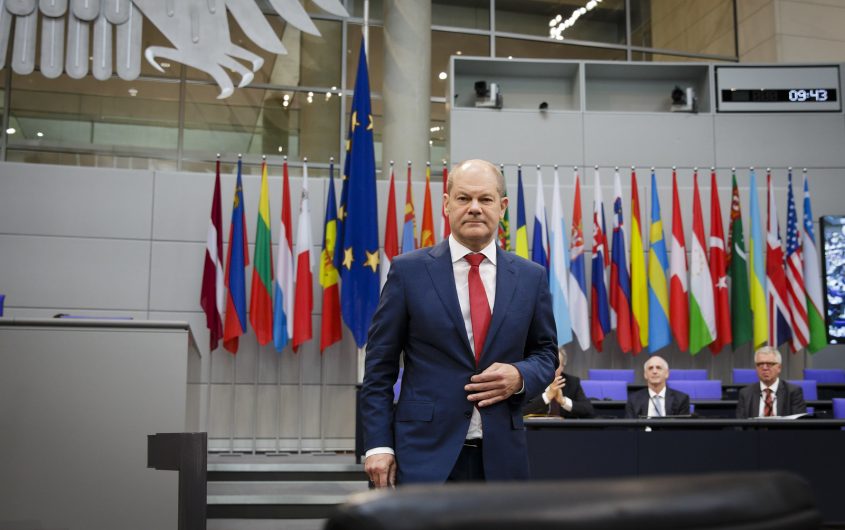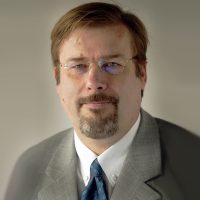
OSCE Parliamentary Assembly via Flickr
German Turning Points

Jackson Janes
President Emeritus of AGI
Jackson Janes is the President Emeritus of the American-German Institute in Washington, DC, where he has been affiliated since 1989.
Dr. Janes has been engaged in German-American affairs in numerous capacities over many years. He has studied and taught in German universities in Freiburg, Giessen and Tübingen. He was the Director of the German-American Institute in Tübingen (1977-1980) and then directed the European office of The German Marshall Fund of the United States in Bonn (1980-1985). Before joining AICGS, he served as Director of Program Development at the University Center for International Studies at the University of Pittsburgh (1986-1988). He was also Chair of the German Speaking Areas in Europe Program at the Foreign Service Institute in Washington, DC, from 1999-2000 and is Honorary President of the International Association for the Study of German Politics .
Dr. Janes is a member of the Council on Foreign Relations, the International Institute for Strategic Studies, the Atlantic Council of the United States, and American Purpose. He serves on the advisory boards of the Berlin office of the American Jewish Committee, and the Beirat der Zeitschrift für Außen- und Sicherheitspolitik (ZfAS). He serves on the Selection Committee for the Bundeskanzler Fellowships for the Alexander von Humboldt Foundation.
Dr. Janes has lectured throughout Europe and the United States and has published extensively on issues dealing with Germany, German-American relations, and transatlantic affairs. In addition to regular commentary given to European and American news radio, he has appeared on CBS, CNN, C-SPAN, PBS, CBC, and is a frequent commentator on German television. Dr. Janes is listed in Who’s Who in America and Who’s Who in Education.
In 2005, Dr. Janes was awarded the Officer’s Cross of the Order of Merit of the Federal Republic of Germany, Germany’s highest civilian award.
Education:
Ph.D., International Relations, Claremont Graduate School, Claremont, California
M.A., Divinity School, University of Chicago
B.A., Sociology, Colgate University
Expertise:
Transatlantic relations, German-American relations, domestic German politics, German-EU relations, transatlantic affairs.
__

Klaus-Dieter Frankenberger
Non-Resident Senior Fellow
Klaus-Dieter Frankenberger is non-Resident Senior Fellow at AICGS.
Past and Present
When Chancellor Olaf Scholz took office three months ago, few expected that he would dramatically change the coordinates of German foreign and defense policy. But on February 27, he announced exactly that—a turning point—in the wake of the Russian war against Ukraine. Translating that speech into new policies has been the preoccupation of the government, but equally important is the response from the German public. The brutal invasion of Putin’s army has left Germans shocked and now confronting what Scholz called a “Zeitenwende,” in which Germany will now have to rethink its ability to deal with war on the European continent. This Wende (change or turn) will also challenge Germans to confront what has been called in the case of an earlier turn a “wall in the head.”
Following the fall of the Berlin Wall in 1989, removing the physical wall was quick. The psychological challenge of unification, after decades of division—the “wall in the head”—has taken much longer to remove. The long-term challenge, as Willy Brandt once put it, was “to let that which belongs together grow back together.” Differences manifest themselves even today, in response to the COVID-19 pandemic, in regional variations of voting behavior, in policy preferences, and in attitudes toward each other.
Germans are facing a similar challenge today to overcome another “wall in the head.” The Russian invasion of Ukraine has shattered long-held assumptions, belief systems, and visions of relations with Russia. A new reality is brutally unfolding, making adjustments unavoidable. Chancellor Scholz confronted that challenge in his February 27 speech when he said “we are living through a watershed era. And that means that the world afterwards will no longer be the same as the world before.” What that means became clear in hearing Scholz list the numerous changes in Germany’s foreign and defense policies, strengthening its ability to defend itself and to secure Europe against the aggression represented by Putin’s war against Ukraine. It was a major turn in policies and in the choices Germany is now facing.
Scholz’s reference to a turning point—a Zeitenwende—is not the first in recent German history which required revising assumptions and expectations and changing behavior. Remembering such changes may be important in meeting today’s challenges.
Having survived the immediate years after World War II, Germans living in the newly-established Federal Republic had to face the Cold War emerging with the Soviet Union. Less than six years after the Federal Republic was born, Germany became a member of NATO in 1955 and quickly rearmed as part of the response by the United States and its allies. This period forged a commitment to provide a large military force as a frontline state within NATO. That was a turning point for most Germans, who had experienced the devastation and guilt of the war’s legacy and would have preferred to retreat from military commitments. Yet in 1990, that commitment was rewarded with German unity and the dissolution of the Soviet Union.
Another turning point came with unification, this one greeted with relief and optimism about the future in post-Cold War era, even though the decade ahead continued to be marked with the reality of “wars of succession” in the former Yugoslavia. The majority of Germans hoped to see the threats of war behind them in a world in which dialogue was more important than deterrence. That was to be the primary basis of German foreign policy, even though the next three decades would continue to be marked by wars elsewhere around the world. Germans now see the return of war to the European continent, after years of thinking that that scourge might have been finally banished.
This time, Germans and Americans face another set of choices together—choices that will require walking together on a long and arduous path as was the case in earlier decades. The threat of nuclear war has arisen in the conflict over Ukraine. Yet as it was in the past, this is a conflict as much about a country as it is about the stability of a world in which conflicts are resolved not by the wages of war but by negotiations in the name of peace. Vladimir Putin seeks to achieve his neo-colonial goals and interests with tanks instead of talks, by war and destruction. The response of Germany, the United States, and their allies requires a robust and comprehensive response including a resilient defense capable of stopping Putin’s aggression. In an earlier era, the lines of defense were clearly drawn and epitomized by the West’s steadfastness in defending the survival of a free Berlin. Today, that line is once again drawn by the NATO alliance and those who are its partners.
How is this different from earlier turning points? In contrast to the Cold War period, there is a far greater web of connections across those lines, which can be used for better or for worse. There are more vulnerabilities as well as opportunities in such an interconnected world. Yet there is also a stronger foundation on which Germans and Americans can base their response to the acts of aggression orchestrated by Putin’s war machine. Why? Because both have rediscovered a sense of togetherness and purpose. The political West, in general, is more united than it has been in a long time. As Chancellor Scholz put it, “Our greatest strength is our alliances.”
Maybe the democratic governments needed the cold shower of Putin’s war to awaken to the reality of a new world, as former U.S. Secretary of Defense Robert Gates has argued. And, yes, maybe it will take some time to finally understand that war is a means employed by unscrupulous autocrats and reckless dictators to advance their interests.
This will be particularly difficult to accept for Germans who until most recently believed they were surrounded by friends, had not much to worry about geopolitically, certainly not in Europe, and that disputes and conflicts could be solved peacefully—the world conceived as a big European Union. Many, including leading German politicians, did not think of Putin’s Russia as an enemy of Europe. This illusion has been disposed of for good, as have many others. That “wall in the head,” separating the search for peace from the need to defend our democracies, has been demolished.
In a recent article in Foreign Affairs, political scientists Michael Beckley and Hal Brands have compared the Russian war on Ukraine with the experiences in the Korean War seven decades ago. The sustained response by the United States and its allies determined the outcome of the Cold War, they argue. And so one might hope Putin’s war—and the multidimensional rivalry with China—will make the United States, Germany, and their allies understand that they really need to get serious about defending the world order which has served their interests so well.
When Chancellor Scholz announced his package of major and unprecedented policy changes, from energy transformation to arms deliveries to Ukraine, he was aware of the turning point for Germany and the consequences this would bring. The idea of Germany being a big Switzerland may still be shared by some. But this delusion will fly no more, thanks to Vladimir Putin. He has helped bring down a “wall in the head” when it comes to the requirement for defending our values and ourselves.
Yet we will have to see how durable this Zeitenwende will be.
Chancellor Scholz has stated, “If we want the last thirty years to be more than an historical exception, then we must do everything we can to maintain the cohesion of the European Union, the strength of NATO, to forge even closer relations with our friends, partners, and all those who share our convictions worldwide.” That includes a commitment to defending all of that with a turning point in the form of a robust and revitalized defense capacity.
For the West, the community of democracies, to hold its ground in this new twilight struggle, it is imperative to understand what is at stake and act accordingly. No walls—mental or physical—should divide us in this moment or in the years to come. In his address to the German Bundestag on March 17, President Zelensky talked a lot about walls, those that divide Ukraine from Europe, those walls that need to be torn down. Citing President Reagan’s 1987 appeal to then Soviet President Gorbachev to “tear down this wall” in Berlin, he asked Germans to tear down the wall in Europe that divides states enjoying freedom and peace from those like Ukraine that struggle to remain free.
Zelensky asked if Germans can overcome the walls and live up to their historic responsibility toward Ukraine and advance the interests of Europe. As Zelensky ended his speech, he pleaded with Chancellor Scholz, “Give Germany the leadership it deserves, so that your descendants will be proud.” There is not yet a physical wall dividing Ukraine and Europe. But preventing that requires us all to overcome walls in our heads.








